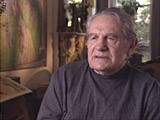
Oral History
Browse an alphabetical list of survivors’ oral histories. These interviews describe firsthand accounts and personal experiences during the Holocaust and World War II.
<< Previous | Displaying results 551-572 of 572 for "Oral History" | Next >>
-
Wilek (William) Loew describes refugees from western Poland after their arrival in Soviet-occupied Lvov
Oral HistoryWilek was the son of Jewish parents living in the southeastern Polish town of Lvov. His family owned and operated a winery that had been in family hands since 1870. Wilek's father died of a heart attack in 1929. Wilek entered secondary school in 1939. Soon after he began school, World War II began with the German invasion of Poland. Lvov was in the part of eastern Poland annexed by the Soviet Union. Although the Soviets took over Wilek's home and the family business, Wilek was able to continue his…
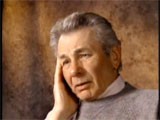
-
Wilek (William) Loew describes the hiding place in which his mother survived an Aktion in Lvov
Oral HistoryWilek was the son of Jewish parents living in the southeastern Polish town of Lvov. His family owned and operated a winery that had been in family hands since 1870. Wilek's father died of a heart attack in 1929. Wilek entered secondary school in 1939. Soon after he began school, World War II began with the German invasion of Poland. Lvov was in the part of eastern Poland annexed by the Soviet Union. Although the Soviets took over Wilek's home and the family business, Wilek was able to continue his…
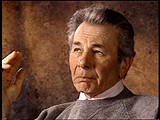
-
Wilek (William) Loew describes the roundup of Jews during August 1942 deportation from Lvov to Belzec
Oral HistoryWilek was the son of Jewish parents living in the southeastern Polish town of Lvov. His family owned and operated a winery that had been in family hands since 1870. Wilek's father died of a heart attack in 1929. Wilek entered secondary school in 1939. Soon after he began school, World War II began with the German invasion of Poland. Lvov was in the part of eastern Poland annexed by the Soviet Union. Although the Soviets took over Wilek's home and the family business, Wilek was able to continue his…
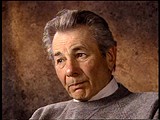
-
Wilek (William) Loew describes the Soviet occupation of Lvov in 1939
Oral HistoryWilek was the son of Jewish parents living in the southeastern Polish town of Lvov. His family owned and operated a winery that had been in family hands since 1870. Wilek's father died of a heart attack in 1929. Wilek entered secondary school in 1939. Soon after he began school, World War II began with the German invasion of Poland. Lvov was in the part of eastern Poland annexed by the Soviet Union. Although the Soviets took over Wilek's home and the family business, Wilek was able to continue his…
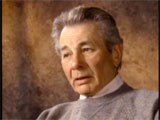
-
William (Bill) Lowenberg describes conditions in the Westerbork camp in the Netherlands
Oral HistoryAs a boy, Bill attended school in Burgsteinfurt, a German town near the Dutch border. After the Nazis came to power in Germany in January 1933, Bill experienced increasing antisemitism and was once attacked on his way to Hebrew school by a boy who threw a knife at him. In 1936, he and his family left Germany for the Netherlands, where they had relatives and thought they would be safe. However, after Germany invaded the Netherlands in May 1940, antisemitic legislation--including the order to wear the Jewish…
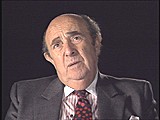
-
William (Bill) Lowenberg describes deportations from the Westerbork camp in the Netherlands
Oral HistoryAs a boy, Bill attended school in Burgsteinfurt, a German town near the Dutch border. After the Nazis came to power in Germany in January 1933, Bill experienced increasing antisemitism and was once attacked on his way to Hebrew school by a boy who threw a knife at him. In 1936, he and his family left Germany for the Netherlands, where they had relatives and thought they would be safe. However, after Germany invaded the Netherlands in May 1940, antisemitic legislation—including the order to wear the…
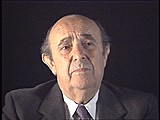
-
William (Bill) Lowenberg describes forced labor in the Kaufering subcamp of the Dachau concentration camp
Oral HistoryAs a boy, Bill attended school in Burgsteinfurt, a German town near the Dutch border. After the Nazis came to power in Germany in January 1933, Bill experienced increasing antisemitism and was once attacked on his way to Hebrew school by a boy who threw a knife at him. In 1936, he and his family left Germany for the Netherlands, where they had relatives and thought they would be safe. However, after Germany invaded the Netherlands in May 1940, antisemitic legislation--including the order to wear the Jewish…
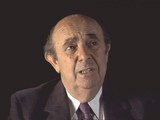
-
William (Bill) Lowenberg describes the importance of bonds of friendship among young people imprisoned in the Westerbork camp
Oral HistoryAs a boy, Bill attended school in Burgsteinfurt, a German town near the Dutch border. After the Nazis came to power in Germany in January 1933, Bill experienced increasing antisemitism and was once attacked on his way to Hebrew school by a boy who threw a knife at him. In 1936, he and his family left Germany for the Netherlands, where they had relatives and thought they would be safe. However, after Germany invaded the Netherlands in May 1940, antisemitic legislation--including the order to wear the Jewish…
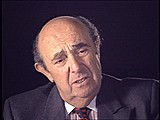
-
William (Bill) Lowenberg describes Zionist and cultural activities in the Westerbork camp
Oral HistoryAs a boy, Bill attended school in Burgsteinfurt, a German town near the Dutch border. After the Nazis came to power in Germany in January 1933, Bill experienced increasing antisemitism and was once attacked on his way to Hebrew school by a boy who threw a knife at him. In 1936, he and his family left Germany for the Netherlands, where they had relatives and thought they would be safe. However, after Germany invaded the Netherlands in May 1940, antisemitic legislation--including the order to wear the Jewish…
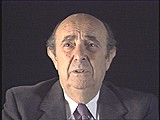
-
William (Bill) Zeck describes acquiring evidence for war crimes trials
Oral HistoryBefore joining the US Army, Zeck—a lawyer—worked for the Board of Economic Warfare. In 1946, he was hired to work on preparations for the Nuremberg trials. In his search for documents pertaining to the I. G. Farben company's involvement in the war, Zeck also met attorney Belle Mayer, his future wife. Both Zeck and Mayer were involved in preparing the indictment in the I. G. Farben trial held at Nuremberg.
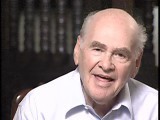
-
William (Bill) Zeck describes the role of the Nuremberg trials in establishing a historical record
Oral HistoryBefore joining the US Army, Zeck—a lawyer—worked for the Board of Economic Warfare. In 1946, he was hired to work on preparations for the Nuremberg trials. In his search for documents pertaining to the I. G. Farben company's involvement in the war, Zeck also met attorney Belle Mayer, his future wife. Both Zeck and Mayer were involved in preparing the indictment in the I. G. Farben trial held at Nuremberg.
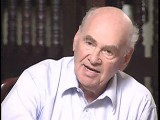
-
William (Bill) Zeck describes the "superior orders" defense
Oral HistoryBefore joining the US Army, Zeck—a lawyer—worked for the Board of Economic Warfare. In 1946, he was hired to work on preparations for the Nuremberg trials. In his search for documents pertaining to the I. G. Farben company's involvement in the war, Zeck also met attorney Belle Mayer, his future wife. Both Zeck and Mayer were involved in preparing the indictment in the I. G. Farben trial held at Nuremberg.
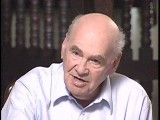
-
William (Bill) Zeck describes translation and witnesses during war crimes trials
Oral HistoryBefore joining the US Army, Zeck—a lawyer—worked for the Board of Economic Warfare. In 1946, he was hired to work on preparations for the Nuremberg trials. In his search for documents pertaining to the I. G. Farben company's involvement in the war, Zeck also met attorney Belle Mayer, his future wife. Both Zeck and Mayer were involved in preparing the indictment in the I. G. Farben trial held at Nuremberg.
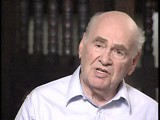
-
William (Bill) Zeck describes war crimes trial prosecution staff
Oral HistoryBefore joining the US Army, Zeck—a lawyer—worked for the Board of Economic Warfare. In 1946, he was hired to work on preparations for the Nuremberg trials. In his search for documents pertaining to the I. G. Farben company's involvement in the war, Zeck also met attorney Belle Mayer, his future wife. Both Zeck and Mayer were involved in preparing the indictment in the I. G. Farben trial held at Nuremberg.
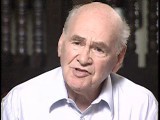
-
William Denson describes counsel provided to accused war criminals
Oral HistoryWilliam Denson graduated from the US Military Academy at West Point in 1934 and attended Harvard Law School. He returned to West Point to teach law from 1942 until 1945. In January 1945, Denson accepted the position of Judge Advocate General (JAG) in Europe and was assigned to US Third Army headquarters in Germany. He took part in more than 90 trials against Germans who had committed atrocities against downed American pilots. In August 1945, Denson became chief prosecutor for the US government at the…
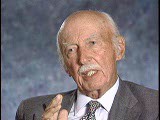
-
William Denson describes finding witnesses for the postwar trials of concentration camp personnel
Oral HistoryWilliam Denson graduated from the US Military Academy at West Point in 1934 and attended Harvard Law School. He returned to West Point to teach law from 1942 until 1945. In January 1945, Denson accepted the position of Judge Advocate General (JAG) in Europe and was assigned to US Third Army headquarters in Germany. He took part in more than 90 trials against Germans who had committed atrocities against downed American pilots. In August 1945, Denson became chief prosecutor for the US government at the…
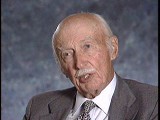
-
William Denson describes postwar trials of concentration camp personnel
Oral HistoryWilliam Denson graduated from the US Military Academy at West Point in 1934 and attended Harvard Law School. He returned to West Point to teach law from 1942 until 1945. In January 1945, Denson accepted the position of Judge Advocate General (JAG) in Europe and was assigned to US Third Army headquarters in Germany. He took part in more than 90 trials against Germans who had committed atrocities against downed American pilots. In August 1945, Denson became chief prosecutor for the US government at the…
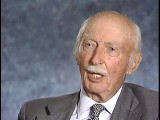
-
William Denson describes some of the emotional difficulties for witnesses in recalling their experiences
Oral HistoryWilliam Denson graduated from the US Military Academy at West Point in 1934 and attended Harvard Law School. He returned to West Point to teach law from 1942 until 1945. In January 1945, Denson accepted the position of Judge Advocate General (JAG) in Europe and was assigned to US Third Army headquarters in Germany. He took part in more than 90 trials against Germans who had committed atrocities against downed American pilots. In August 1945, Denson became chief prosecutor for the US government at the…
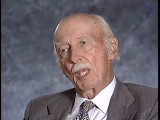
-
William Denson describes the nature of the evidence uncovered for postwar trials of concentration camp personnel
Oral HistoryWilliam Denson graduated from the US Military Academy at West Point in 1934 and attended Harvard Law School. He returned to West Point to teach law from 1942 until 1945. In January 1945, Denson accepted the position of Judge Advocate General (JAG) in Europe and was assigned to US Third Army headquarters in Germany. He took part in more than 90 trials against Germans who had committed atrocities against downed American pilots. In August 1945, Denson became chief prosecutor for the US government at the…
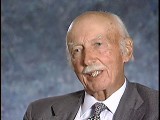
-
William (Welek) Luksenburg describes the first night of the German invasion of Poland
Oral HistoryShortly after the German invasion of Poland in September 1939, William's family was ordered into a ghetto and his brother went to a work camp. William bribed officials to discharge his brother from a hospital destined for evacuation to Auschwitz. Later, after escaping from a prison camp to tend to his brother, William was jailed. He was sent to Blechhammer, Gleiwitz (where he met his future wife), and other camps. William collapsed during a death march near the Austrian border, but was then liberated. His…
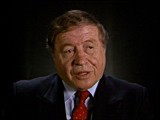
-
Władysław Bartoszewski discusses Żegota
Oral HistoryWładysław Bartoszewski (1922–2015) was a co-founder and member of the Council for Aid to Jews, codenamed “Żegota.” Żegota was a clandestine rescue organization of Poles and Jews in German-occupied Poland. Supported by the Polish government-in-exile, Żegota coordinated efforts to save Jews from Nazi persecution and murder. It operated from 1942 to 1945. After World War II broke out in 1939, Władysław worked as a janitor at a Polish Red Cross clinic. In the fall of 1940, Władysław was caught…
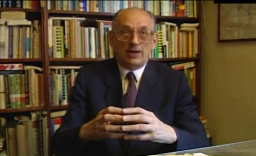
-
Yonia Fain describes leaving Warsaw after the German invasion of Poland
Oral HistoryAfter World War I, Yonia's family moved to Vilna. Yonia studied painting and graduated from the Academy of Fine Arts in Vilna. When Germany invaded Poland in September 1939, Yonia was living with his wife in Warsaw. They fled to Brest-Litovsk in eastern Poland, occupied by Soviet forces in mid-September 1939. Then Yonia and his wife escaped to Vilna. After the Soviets occupied Vilna in June 1940, Yonia and his wife forged Japanese transit visas and left for Japan. In Japan, they were unable to obtain valid…
